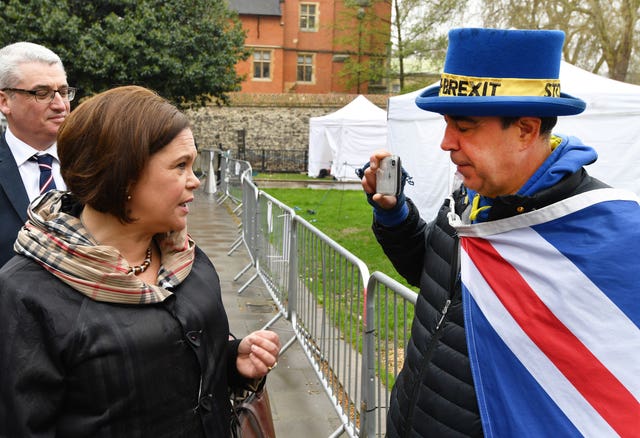Northern Ireland Secretary Karen Bradley does not have a “deep appreciation” of Irish politics, the leader of Sinn Fein has claimed.
Party president Mary Lou McDonald made the comments as she accused the Cabinet minister of making “erroneous and dangerous” comments about voting rights in a potential border poll.
Ms Bradley recently sparked controversy when she appeared to suggest that Irish citizens living in the UK could not vote in such a referendum, but the Government later moved to clarify her remarks.
The debate on Irish unification has gained higher priority since the Brexit referendum in 2016.
Commenting on the confusion, Mrs McDonald – on a visit to Westminster for Brexit talks – told the Press Association: “Karen Bradley has proven not to have a very deep appreciation of Irish politics or the dynamic of Irish politics…
“I’m alarmed that as I speak to you now, more than 20 years after the signing of the Good Friday Agreement, that the British Government and state insists that Irish people living in the north of Ireland are British.
“And I am concerned that the Secretary of State would make such ill-judged and inaccurate comments around people’s right to vote in any potential unity referendum. That worries me and that does undermine public confidence in her.”
Asked if Ms Bradley should resign, Mrs McDonald said it “wouldn’t solve the problem”.

“The issue that we have here regards this Government’s stewardship of the peace process is far deeper and goes much wider than Karen Bradley.”
Last month Labour MP Conor McGinn asked the Northern Ireland Secretary why the reciprocal voting rights for Irish citizens do not cover referenda.
In her reply, Ms Bradley said: “The voting rights which will continue to be enjoyed by British and Irish citizens are reciprocal.
“British citizens may vote in local and parliamentary elections in Ireland but not presidential elections or referendums. This reciprocal right is reflected in the voting rights of Irish citizens living in the United Kingdom.”
The Government later said voter eligibility rules for referenda were determined on a poll by poll basis.
Irish citizens were able to vote in the 2016 EU referendum.
A Government spokesman said rules for a border poll would be set in line with the Good Friday peace agreement.
“The rules surrounding any referendum are set in legislation specific to that poll, as happened in 2016 (for the Brexit referendum),” he said.
“Any decisions on a border poll would be made in line with the Belfast Agreement.”
Sinn Fein vice-president Michelle O’Neill will be holding talks with Ms Bradley in Westminster on Monday, while Mrs McDonald will meet Labour leader Jeremy Corbyn.
Ahead of the talks, Mrs McDonald warned that a customs union does not “solve the problem for the north of Ireland”.
She said a customs union “probably makes sense for Britain” but said: “You need to be aware that membership of the customs union alone does not solve the problem for the north of Ireland – we need alignment also with the single market.
“These are the bare minimums that are required just to keep the lights on on our island. I think for our purposes we have to be clear that this Brexit saga cannot go on indefinitely – there actually has to be a conclusion, there has to be an end point.
“Whether there is a deal, and I hope there is, or no deal, I hope that that doesn’t come to pass, but irrespective of whether there’s a deal or no deal or an extension of any duration, we are very clear, and the British political system needs to be very clear, that the commitments made to Ireland must be honoured.”
